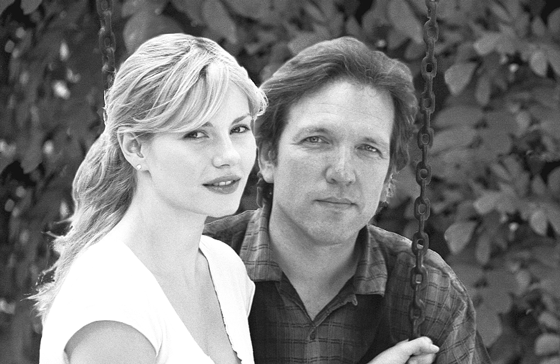The bourgeois, the dysfunctional, the dull, “The Quiet”
Nina Deer (Elisha Cuthbert) lives with her mother, who is addicted to prescription painkillers and tranquilizers, and her father (Martin Donovan), who has a dark secret that’s all too easy to figure out.
I didn’t think it was possible, but “The Quiet” beats Michael Cuesta’s “Twelve and Holding” for the coveted crown of 2006’s most smug assault on American suburbia. Screenwriters Abdi Nazemian and Micah Schraft have written two made-for-ABC Family Channel movies. In “The Quiet,” their worldview simply inverts the network’s. This is an anti-sitcom as banally anti-bourgeois as “Leave It To Beaver” and “The Cosby Show” were blandly bourgeois. Their script would only have worked if a director really embraced its sleaziness, but every single film that has tread this territory—even “American Beauty”—aspires to Indie edginess or an arty patina. If only our generation’s Russ Meyer had arrived!
Nina Deer (Elisha Cuthbert) lives with her parents (Edie Falco and Martin Donovan) in suburban Connecticut. After Dot’s (Camilla Belle) father dies in a car accident—her mother succumbed to cancer when Dot was seven—the Deers decide to adopt the teenage girl, who’s deaf and mute. At first, Nina treats Dot with complete contempt, but she eventually turns to her as a confidant. Her mother is addicted to prescription painkillers and tranquilizers, spending her days in a drug-induced stupor. Her father has a secret, which alert viewers will be able to guess 10 minutes into the film.
Babbit’s direction has improved since her campy debut, “But I’m A Cheerleader.” Using high definition digital video, cinematographer David Mullen doesn’t try to make it look like film. The colors are tinged blue, the screen filled with odd pools of light. In one scene, the kitchen sink is bathed in a delicate glow.
While the cinematography is often quite attractive, it’s less effective in the film’s less stylized moments. HD video’s defining characteristic is a crisp gloss; Mullen tries subverting it, to the point where he filled the set with smoke. He succeeds in creating a fuzzy image, but its murk and slightly out-of-focus look don’t add much to the “The Quiet.” The results make one wonder why he didn’t simply use a lower-grade camera. Mullen seems to be aiming for the look of Christopher Doyle’s cinematography for Wong Kar Wai’s films, but his work rests on the fine line between unconventionally appealing and ugly.
Cuthbert is best known for her appearance as Kiefer Sutherland’s daughter on “24,” but her role always seemed decorative. The changes Nina goes through require an actress capable of more subtlety than she can bring to the part. Falco’s performance as yet another troubled housewife won’t make anyone forget “The Sopranos.” As Nina’s father, Martin Donovan acts only slightly less tranquilized than his wife.
This film’s crassness becomes evident early on, when Nina and her friend Michelle—cheerleaders, of course—lunch on candy, which they wash down with Diet Coke. Not even the dimmest viewer could miss Babbit’s signposting of the girls’ confusion and hypocrisy. The cheerleader’s uniforms may as well read “TEEN SLUT.” Dot’s trite, pretentious voice-over reinforces the impression that the filmmakers are aiming for the lowest common denominator.
“The Quiet” establishes homoerotic tension between Nina and Michelle—who talk about kissing while watching soft-core porn—but never develops it, while there’s something sadomasochistic about the ever-changing relationship between Nina and Dot. The latter is probably the film’s most interesting facet, but the script spoils it with a final twist that skirts ridiculousness. If you’re expecting a lesbian point-of-view on contemporary suburbia, this isn’t it—that perspective is so buried it’s barely visible
“The Quiet” often tries for comedy, but it rarely achieves it. The dialogue is mean-spirited without the saving grace of real wit. If it aims for satire, it misses by taking aim at such a clichéd target; its sensibility reeks of the small screen. While Babbit’s directed many episodes of TV shows like “Nip/Tuck” and “Malcolm in the Middle,” “The Quiet” feels like her audition for “Desperate Housewives.” Critic David Rooney was on target in calling it “a Lifetime movie on crack.” It takes a rare talent to make a wildly dysfunctional family this dull.
gaycitynews.com



































